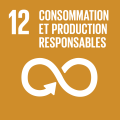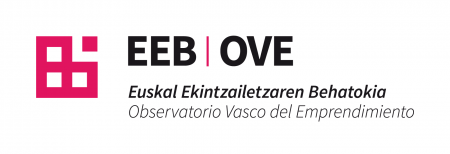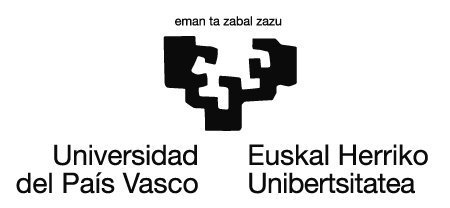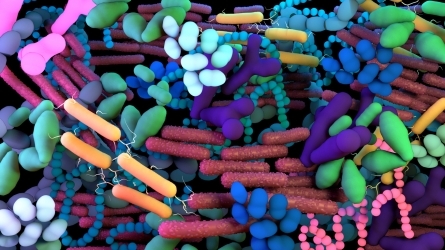Emprendimiento innovador sostenible: retos y oportunidades
El Emprendimiento Innovador, clave para el impulso de estrategias de Economía Circular
Description
El Curso de Verano abordará el papel del emprendimiento circular como motor de creación de innovación, empleo y riqueza en el contexto socio-económico actual.
Está divido en 5 bloques temáticos:
- Emprendimiento circular industrial.
- Financiación de impacto y emprendimiento innovador.
- B-corps y emprendimiento sostenible.
- Mujer emprendedora y sostenibilidad.
- Impulso del emprendimiento sostenible y circular.
Esta actividad se liderará desde el Grupo ECISE UPV/EHU. ECONOMÍA CIRCULAR, INNOVACIÓN, SOSTENIBILIDAD Y EMPRENDIMIENTO - GIU 21/025, en colaboración con el Grupo "Innovación, Conocimiento, Emprendimiento y Sostenibilidad" de la Universidad de Deusto. Cuenta con el apoyo del Observatorio Vasco de Emprendimiento EEB-OVE.
El Curso de Verano tiene continuidad en Donostia / San Sebatian con un Workshop Internacional de investigación sobre la misma temática "Emprendimiento Sostenible" y co-organizado por los dos grupos de investigación.
Objectives
Visibilizar al colectivo emprendedor innovador como agente impulsor clave de la transición hacia estrategias de Economía Circular.
Generar un foro de intercambio de conocimiento y experiencias universidad-empresa-institución sobre emprendimiento circular y sostenible.
Identificar retos y oportunidades para nuevos emprendimientos sostenibles innovadores.
Generar ideas y nuevas iniciativas de política económica, educativa e industrial para el impulso de la Economía Circular.
Activity directed to
- University student
- Teachers
- Professionals
Program
24-06-2024
Registro
Institutional Opening session. Speaking order:
- Iñaki Peña Bandrés | IP del Grupo ICES. Deusto Business School (DBS)
- María Saiz Santos | IP del grupo ECISE UPV/EHU
- Noemi Peña Miguel | UPV/EHU - Directora de Emprendimiento y Transferencia. Zitek
PANEL 1: ECONOMÍA CIRCULAR INDUSTRIAL
“Economía circular industrial: retos y oportunidades“
- Rikardo Minguez Gabiña | UPV/EHU - Director del Máster en Economía Circular: Aplicación a la Empresa
Round table: “Economía circular industrial“
- María Saiz Santos | UPV/EHU y EEB-OVE - Directora del Máster en Emprendimiento y Dirección de Empresas (Moderator)
- María García Flecha | Directora de Estrategia de Ihobe
- Diego Zuñiga Garcia-Falces | UBYKO - CEO
- Rikardo Minguez Gabiña | UPV/EHU - Director del Máster en Economía Circular: Aplicación a la Empresa
Break
PANEL 2: EMPRENDIMIENTO SOSTENIBLE FEMENINO
“Emprendimiento sostenible y mujer“
- María del Mar Fuentes Fuentes | Universidad de Granada - Catedrática de Organización de Empresas. Directora de "Son Pioneras"
Round table: “Emprendimiento femenino y sostenibilidad“
- Covadonga Aldamiz-echevarría González de Durana | UPV/EHU - Directora de Enpresa Institutua (Moderator)
- Ariana Martín | ROSEO - CEO
- Zaira Vicente Adame | Cofundadora de Bzmk creative contents
- María del Mar Fuentes Fuentes | Universidad de Granada - Catedrática de Organización de Empresas. Directora de "Son Pioneras"
Pósteres & Café
25-06-2024
PANEL 3: IMPULSO DEL EMPRENDIMIENTO SOSTENIBLE
“La certificación B-Corp“
- Ana Fernández Laviada | Observatorio GEM España. Universidad de Cantabria - Presidenta
Round table: “Herramientas de impulso al emprendimiento sostenible“
- Julián Pando García | UPV/EHU - Director del ExecutiveMBA (Moderator)
- Gilda Zarate Chabluk | Business Humanizer
- Ana Fernández Laviada | Observatorio GEM España - Presidenta
- Unai Tamayo Orbegozo | UPV/EHU - Codirector Máster en Marketing y Ventas
Pósteres & Café
“Emprendimiento sostenible e inversión de impacto“
- Jon Hoyos Iruarrizaga | UPV/EHU
PANEL 4: B-CORP Y EMPRENDIMIENTO SOSTENIBLE
Round table: “Emprendimiento B-corp“
- Jon Hoyos Iruarrizaga | UPV/EHU (Moderator)
- Anna de Gea Fiter | Ship2B - Program Manager
- Joseba Villate | Alterity - CEO
- Oscar Ugarte | Seed Capital - CEO
- Inmaculada Ramos Pérez | Gaztenpresa - Directora
Pósteres & Café
PANEL 5: INVERSIÓN DE IMPACTO
“Emprendimiento sostenible: herramientas de impulso“
- Noemi Peña Miguel | UPV/EHU - Directora de Emprendimiento y Transferencia. Zitek
Round table: “Inversión de impacto“
- Noemi Peña Miguel | Gaztenpresa - Directora (Moderator)
- Leire Barañano Orbe | NEIKER - Directora General
- Jorge Sánchez Dolado | Photokrete - CSO
- Margarita Arenas | Bioinnovate - CEO
- Jenny María Ruiz Jiménez | Subdirectora de emprendimiento de la Universidad de Granada‐UGR Emprendedora
Pósteres & Café
Closing session
- Gorka Moreno Márquez | UPV/EHU - Vicerrector del Campus de Bizkaia
- María Saiz Santos | UPV/EHU y EEB-OVE - Directora del Máster en Emprendimiento y Dirección de Empresas
Directors
Doctora en Economía y Empresa por la Universidad del País Vasco (UPV/EHU). Acreditada para Prof. Pleno Presidenta del Observatorio Vasco de Emprendimiento EEB-OVE IP y Directora Ejecutiva de GEM Euskadi, Global Entrepreneurship Monitor miembro investigador fundador desde el año 2004. Comité de Dirección de GEM España Directora del Máster de Emprendimiento y Dirección de Empresas, MBAe3, Universidad del País Vasco UPV/EHU. Investigadora Principal (IP) del Grupo ECISE: Economía Circular, Innovación, Sostenibilidad Y Emprendimiento. Investigadora en los Proyectos ERASMUS + Reinventing Mentoring in Arts Management , ERASMUS + VI-TRAIN-Crafts y ERASMUS+ E4TLI, EDUCATION FOR TECHNOLOGICAL LITERACY AND INCLUSION. Mentora de emprendedores/as en YBS/Laboral Kutxa Comité técnico de Startinnova Perfil destacado universidad-empresa por Spanning Boundaries (UIIN) Evaluadora de acreditaciones ACEEU (Accreditation Council for Entrepreneurial and Engaged Universities) Directora de Relaciones Externas Campus de Bizkaia, UPV/EHU (2007-2014). Directora y fundadora del programa de creación de Spin offs, ZITEK. Profesora de emprendimiento y trasferencia en 7 másteres.
Speakers

Covadonga Aldamiz-echevarría González de Durana
Universidad del País Vasco / Euskal Herriko Unibertsitatea
Directora del Enpresa Institutua - Instituto de Economía Aplicada a la Empresa en UPV/EHU Profesora Titular de Marketing UPV/EHU

Margarita Arenas

Leire Barañano Orbe
General Manager of NEIKER. She is a member of the governing boards of the Elhuyar Foundation and the Elika Foundation, of the board of the European Forest Institute (EFI) and of the board of directors of the Basque Research and Technology Alliance (BRTA). In 2021, he joined the Basque Council for Science, Technology and Innovation.

Anna de Gea Fiter

Ana Fernández Laviada
Presidenta del Observatorio del Emprendimiento de España (Red GEM España) Directora del Centro Yunus de la Universidad de Cantabria Profesora Titular de Economía Financiera y Contabilidad de la Facultad de CCEE y Empresariales

María del Mar Fuentes Fuentes
Catedrática de Organización de Empresas de la Universidad de Granada Directora de #Sonpioneras Directora de Emprendimiento de Universidad de Granada 2015-2023

María García Flecha
Ihobe

Jon Hoyos Iruarrizaga
Universidad del País Vasco
Profesor Agregado de la Universidad del País Vasco UPV-EHU- Doctor en CC. Económicas y Empresariales por la UPV-EHU. Ha sido Codirector del Máster en Emprendimiento y Dirección de Empresas (MBAe3) de la UPV-EHU durante las ediciones 2016/17, 2017/18 y 2018/19 y miembro de la Comisión Académica del Máster desde 2022. Su actividad docente e investigadora se ha centrado en cuestiones relacionadas con el emprendimiento tecnológico, los mecanismos de transferencia y la creación de nuevas empresas, particularmente en lo que se refiere a los modelos alternativos de financiación. Defendió la tesis con la máxima calificación bajo el título “Financiación del proceso start-up: Un doble enfoque business angel-emprendedor”. Desde el año 2006, participa como miembro investigador del consorcio de investigación internacional Global Entrepreneurship Monitor (GEM), proyecto de referencia indiscutible en la medición de la actividad emprendedora a escala internacional. Miembro fundador del Observatorio Vasco de Emprendimiento (OVE/EBB). Es autor de varios libros y artículos científicos en revistas nacionales e internacionales (indexadas).

Ariana Martín
CEO en Roseo Eólica Urbana Licenciada en Administración y Dirección de Empresas UPV/EHU MBAe3 Máster en Emprendimiento y Dirección de Empresas UPV/EHU

Rikardo Minguez Gabiña
University of the Basque Country (UPV/EHU)
Industrial Engineer specialized in Mechanical engineering (1995) by the Faculty of Engineering in Bilbao. He works at the Department of Graphic Design and Engineering Projects since 1998. He was recognized as Full Professor since 2019. Head of the Department of Graphic Design and Engineering Projects since 2016. Chair of the board of studies of the Master's Degree 'Circular Economy: Business Application' of the University of the Basque Country. He joined Laval University in Québec in 2005 as a visiting scientist. He works in the Product Design Laboratory since its creation in 2005, and in the Life Cycle Thinking Group. His current research focuses on Product Life Cycle Assessment, Ecodesign and Circular Economy.

Gorka Moreno Márquez
UPV/EHU, Vicerrector del Campus de Bizkaia
Profesor Titurlar en el Departamento de Sociología y Trabajo Social de la Universidad del País Vasco y miembro de Ikuspegi-Observatorio Vasco de Inmigración y del Grupo de Investigación Parte Hartuz. Ex director de Ikuspegi (2011-2019). Tiene una amplia experiencia docente en grado y posgrado, tanto en la UPV/EHU, como en otras universidades españolas y latinoamericanas. Sus principales líneas de investigación son las migraciones internacionales, las políticas sociales o la exclusión social. En este sentido ha realizado diferentes investigaciones en el campo de las actitudes hacia la inmigración, los procesos de integración del colectivo inmigrante o el sinhogarismo. Ha publicado varios libros y artículos en revistas académicas sobre estos temas y participa asiduamente en congresos jornadas y seminarios. Imparte también charlas y seminarios sobre la inmigración a entidades sociales, asociaciones y ciudadanía en general.

Julián Pando García
UNIVERSIDAD DEL PAIS VASCO

Noemi Peña Miguel
UPV/EHU
Noemí Peña-Miguel is a professor and researcher at the Faculty of Economics and Business. She holds a PhD in Economics and Business Administration from the University of the Basque Country (UPV/EHU). Extraordinary Doctorate Award from the UPV/EHU. Director of Entrepreneurship and Transfer of the Bizkaia Campus of the University of the Basque Country (UPV/EHU) since January 2018 and responsible for the Zitek program for the promotion of entrepreneurial culture and the creation of innovative and technology-based companies. She has worked as Deputy to Management, and to the Financial and Human Resources management in Grupo Urgatzi, a group of companies in the socio-health sector from 2000 to 2011.

Inmaculada Ramos Pérez
Fundación Gaztenpresa
Directora de Gaztenpresa-Laboral Kutxa Licenciada en Economía, UPV/EHU

Jenny María Ruiz Jiménez
Universidad de Granada

Unai Tamayo Orbegozo
UPV/EHU
Doctor en Ciencias Económicas y Empresariales. Profesor Titular en comercialización e investigación de mercados en la Universidad del País Vasco UPV/EHU. Es codirector del máster en marketing y ventas de la UPV/EHU. Como investigador, es especialista en el campo del Marketing Ecológico. Sus intereses de investigación actuales incluyen Marketing Ambiental, Economía Circular, Responsabilidad Social Corporativa, nuevas tendencias en aprendizaje y métodos de investigación. Ha publicado en revistas indexadas. Actualmente es Vicedecano de Alumnado y Empleo en la Facultad de Economía y Empresa de la UPV/EHU (desde 2022).

Oscar Ugarte

Zaira Vicente Adame
bzmk creative contents

Joseba Villate
Doctora en Economía y Empresa por la Universidad del País Vasco (UPV/EHU). Acreditada para Prof. Pleno Presidenta del Observatorio Vasco de Emprendimiento EEB-OVE IP y Directora Ejecutiva de GEM Euskadi, Global Entrepreneurship Monitor miembro investigador fundador desde el año 2004. Comité de Dirección de GEM España Directora del Máster de Emprendimiento y Dirección de Empresas, MBAe3, Universidad del País Vasco UPV/EHU. Investigadora Principal (IP) del Grupo ECISE: Economía Circular, Innovación, Sostenibilidad Y Emprendimiento. Investigadora en los Proyectos ERASMUS + Reinventing Mentoring in Arts Management , ERASMUS + VI-TRAIN-Crafts y ERASMUS+ E4TLI, EDUCATION FOR TECHNOLOGICAL LITERACY AND INCLUSION. Mentora de emprendedores/as en YBS/Laboral Kutxa Comité técnico de Startinnova Perfil destacado universidad-empresa por Spanning Boundaries (UIIN) Evaluadora de acreditaciones ACEEU (Accreditation Council for Entrepreneurial and Engaged Universities) Directora de Relaciones Externas Campus de Bizkaia, UPV/EHU (2007-2014). Directora y fundadora del programa de creación de Spin offs, ZITEK. Profesora de emprendimiento y trasferencia en 7 másteres.

Jorge Sánchez Dolado

Gilda Zarate Chabluk

Diego Zuñiga Garcia-Falces
CEO de Ubyko Licenciado, Comunicación y Periodismo. Universidad de Navarra MA, Visual Journalism. Poynter Institute for Media Studies MBAe3 Máster en Emprendimiento y Dirección de Empresas. UPV/EHU
Registration fees
| Face-to-face | Until 24-06-2024 |
|---|---|
| 25,00 EUR | |
| 15,00 EUR | |
| 10,00 EUR | |
| 0 EUR | |
| 0 EUR |
Venue
Bizkaia Aretoa-UPV/EHU
Avenida Abandoibarra, 3. 48009- Bilbao
Bizkaia
Bizkaia Aretoa-UPV/EHU
Avenida Abandoibarra, 3. 48009- Bilbao
Bizkaia
Sustainable development goals
Agenda 2030 is the new international development agenda approved in September 2015 by the United Nations. This agenda aims to be an instrument to favour sustainable human development all over the planet, and its main pillars are the eradication of poverty, a reduction in equality and vulnerability and fostering sustainability. It is a unique opportunity to transform the world up to 2030 and guarantee human rights for all.

5 - Gender equality
Achieve gender equality and empower all women and young girls. Key issues: the end of all forms of discrimination and violence, recognition of unpaid care and domestic work, shared responsibility, equal opportunities, full and effective participation in reproductive rights, equal rights vis-à-vis economic resources, access to land and other assets and ownership.
More information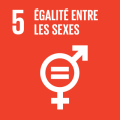
7 - Affordable and clean energy
Guaranteeing access to affordable, reliable, sustainable and modern energy for everyone. Key issues: universal access, increased proportion of clean energies, energy efficiency, research, fostering investments in energy infrastructures and clean technologies, modern and sustainable energy services.
More information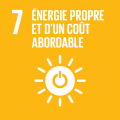
8 - Decent work and economic growth
Foster sustained, inclusive and sustainable economic growth, full and productive employment and decent work for everyone. Key issues: decent work, full and productive employment, entrepreneurship, fostering micro-companies and SMEs, employment rights, safe working environments, youth employment, equal opportunities and pay, strengthening of financial institutions, and breaking the link between economic growth and the degradation of the environment.
More information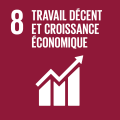
9 - Industry, innovation and infrastructure
Build resilient infrastructures, promote inclusive and sustainable industrialisation and foster innovation. Key issues: reliable, sustainable, resilient and quality infrastructures, inclusive and sustainable industrialisation, modernisation, clean and environmentally rational industrial technologies and processes, scientific research and improvement of technological capabilities, universal access to ICTs.
More information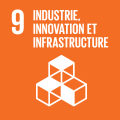
11 - Sustainable cities and communities
Make cities and other human settlements inclusive, safe, resilient and sustainable. Key issues: access to suitable housing and basic services that are secure and affordable, suitable and sustainable transport systems, inclusive urban planning, participative planning and management, protection of cultural and natural heritage, air-quality, green zones, and connections between urban, peri-urban and rural areas.
More information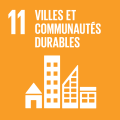
12 - Responsible consumption and production
Guarantee sustainable modalities of consumption and production. Key issues: sustainable management and efficient use of natural resources, reduction of chemical particles released to the atmosphere, water and soils, reduction of waste products, recycling, reuse and reduction, sustainable practices, sustainable public procurement, sustainable lifestyles, rationalisation of inefficient subsidies for fossil fuels.
More information